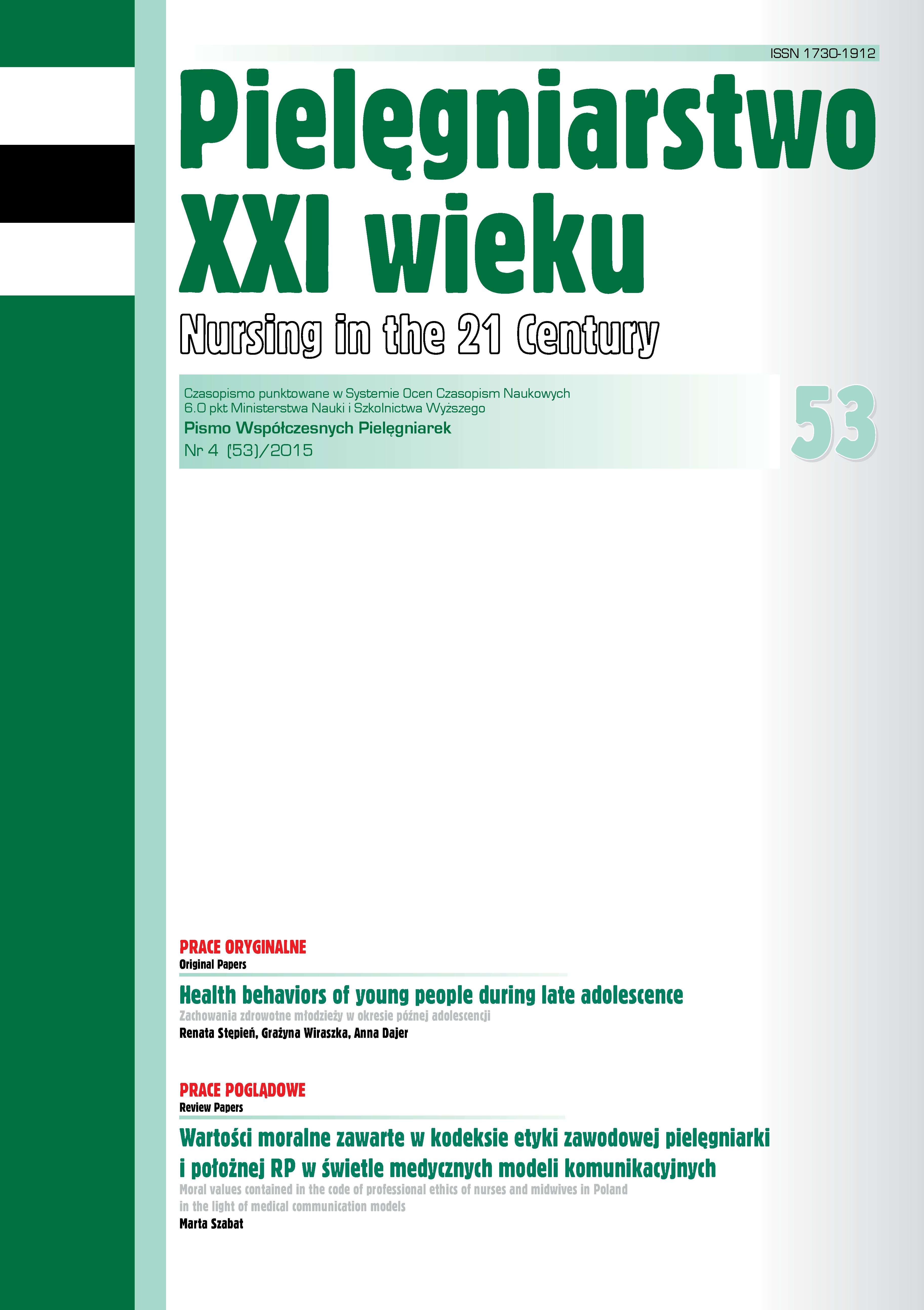Attitudes and knowledge of preschool children’s parents about preventive vaccinations
DOI:
https://doi.org/10.12923/p21w-2015-4/58Keywords:
vaccinations, attitude, parentsAbstract
ATTITUDES AND KNOWLEDGE OF PRESCHOOL CHILDREN’S PARENTS ABOUT PREVENTIVE VACCINATIONS
Introduction. Despite being mandatory, the preventive vaccinations in Poland stir up numerous controversies and cause concern among parents, mostly because of potential medical complications after vaccinations. Because of the favourable epidemiological situation more and more parents are not confident whether preventive vaccinations for children are still necessary. On the other hand, scientists are warning against the recurrence of infectious diseases that have been controlled through vaccination. The ongoing discussion whether to vaccinate or not, leaves parents in dismay. On the one hand, this situation makes some parents give up vaccinating their children, on the other, promotes education and conscious decision-making processes.
Aim. The aim of this study was to describe the level of the knowledge, experience and the opinion of parents of children of preschool age in the area of protective vaccination. The results can be used as educational material. Material and Methodology. The study included 102 parents of preschool children. Diagnostic survey method was applied in the research, using the author’s questionnaire.
Results. Less than half of respondents (48%) knows the optimal age at which a person should be vaccinated against tuberculosis, more than half (56.9%) knows when to provide the first dose of the Polio vaccine. Approximately half of the respondents (51%) knows the diseases (measles, mumps and rubella) against which the MMR vaccine protects. The respondents know additional immunization program (82.4%). They also know such terms as the combined vaccine (90.2%) and postvaccination reaction (69.8%). The fear of vaccination was reported by approximately 5% of respondents (definitely yes). Some parents (31.7%) do not notice any concern against vaccinations, the remaining ones are worried about possible complications (30.7%), an allergic reaction and the fear of a needle prick. Parents with university education report more doubts and fears. According to 36.6% of respondents, parents should take the decision on their child vaccination, but only 6.9% have sufficient knowledge on this topic. The surveyed people who are definitely against punishment of parents who do not vaccinate children account for 19.6%. Among all of the surveyed, only one person admitted that his/her child was not vaccinated and this was his/her personal choice. The respondents benefit from recommended vaccinations (49%), mostly against rotavirus. Most of the surveyed people (69%) would vaccinate their children with recommended vaccines if they were free of charge.
Conclusion. Analysis of the studies shows that parents of preschool children have an average level of knowledge about immunizations. Most respondents think that the number and the kind of mandatory vaccinations are correct. More than half of respondents believes that vaccinations of children do not endanger their lives and health. The vast majority of parents do not observe in their children the side effects after vaccination.
References
1. Trybulec M. Dajmy szansę na profilaktykę chorób. Szczepienia. Medycyna Praktyczna. 2015; 3 (15):11-14.
2. Szenborn L, Czajka H, Wysocki J. Kontrowersje wokół szczepień. Przegląd Lekarski. 2009; 66: 1-2, 65-71.
3. Gieryńska M, Schollenberger A. Molekularne rozpoznawanie zakażeń wirusowych – stymulacja odpowiedzi immunologicznej. Postępy Hig Med Dosw (online). 2011; 65: 299-313.
4. Magdzik W, Naruszewicz-Lesiuk D, Zieliński A. Wakcynologia. Wyd. 1. Bielsko-Biała: Alfa-medica Press; 2005.
5. Rozporządzenie Ministra Zdrowia z dnia 21 grudnia 2010 r. w sprawie niepożądanych odczynów poszczepiennych oraz kryteriów ich rozpoznawania (Dz.U. 2010 nr 254 poz. 1711)
6. Ustawa z dnia 5 grudnia 2008 r. o zapobieganiu oraz zwalczaniu zakażeń i chorób zakaźnych u ludzi (Dz.U. 2008 nr 234 poz. 1570).
7. Rozporządzenie ministra zdrowia z dnia 18 sierpnia 2011 r. w sprawie obowiązkowych szczepień ochronnych (Dz.U. 2011 nr 182 poz. 1086).
8. Tarczoń I, Domaradzka E, Czajka H. Co na temat szczepień ochronnych wiedzą rodzice i pracownicy ochrony zdrowia? Przegląd Lekarski. 2009; 66: 27-33.
9. Rogalska J, Augustynowicz E, Gzyl A, i wsp. Postawy rodziców wobec szczepień ochronnych w Polsce. Przegląd Epidemiologiczny. 2010; 64: 91-97.
10. What do parents think? Knowledge and attitudes about immunization. June 2015 dostępne: http://www.publichealth.lacounty.gov/ha/reports/LAHealthBrief2011/Immunization/Immunization_2015Fs.pdf (data otwarcia: 10.12.2015 r.)
11. zBorn Z, Yiu V, Sullivan T. Provinces divided over mandatory vaccination for school children. May 22, 2014 dostępne: http://healthydebate.ca/2014/05/topic/health-promotiondisease-prevention/mandatory-school-entry-vaccinations (data otwarcia: 10.12.2015 r.)
12. Papazogulou A, Papadellis F, Tsiftis G, et al. The attitudes of parents to the vaccination of children. A study in kindergartens in Athens Arheia Ellenikes Iatrikes;2012, 29 (4): 461 Dostępne: http://connection.ebscohost.com/c/articles/90253734/attitudes-parentsvaccination-children-study-kindergartens-athens (data otwarcia 11.12.2015 r.)
13. Rogers C. Parents’ Vaccine Beliefs: A Study of Experiences and Attitudes Among. Parents of Children in Private Pre-School. dostępne: https://www.rimed.org/rimedicaljournal/2014/04/2014-04-27-contribution-vaccines.pdf (data otwarcia: 10.12.2015 r.).
14. Rogalska J, Augustynowicz E, Gzyl A, i wsp. Źródła informacji oraz wiedza rodziców na temat szczepień ochronnych w Polsce. Przegląd Epidemiologiczny. 2010; 64: 83- 90.
15. Kalinowski P, Makara-Studzińska M, Kowalewska M. Analiza wpływu posiadania potomstwa na opinie dotyczące wykonywania szczepień ochronnych. Problemy Higieny i Epidemiologii. 2014; 95(2): 273-278.
Downloads
Published
Issue
Section
License
Copyright (c) 2015 Anita Orzeł-Nowak, Natalia Bińkiewicz-Śmiałek, Lucyna Ścisło, Elżbieta Walewska (Autor)

This work is licensed under a Creative Commons Attribution 4.0 International License.




